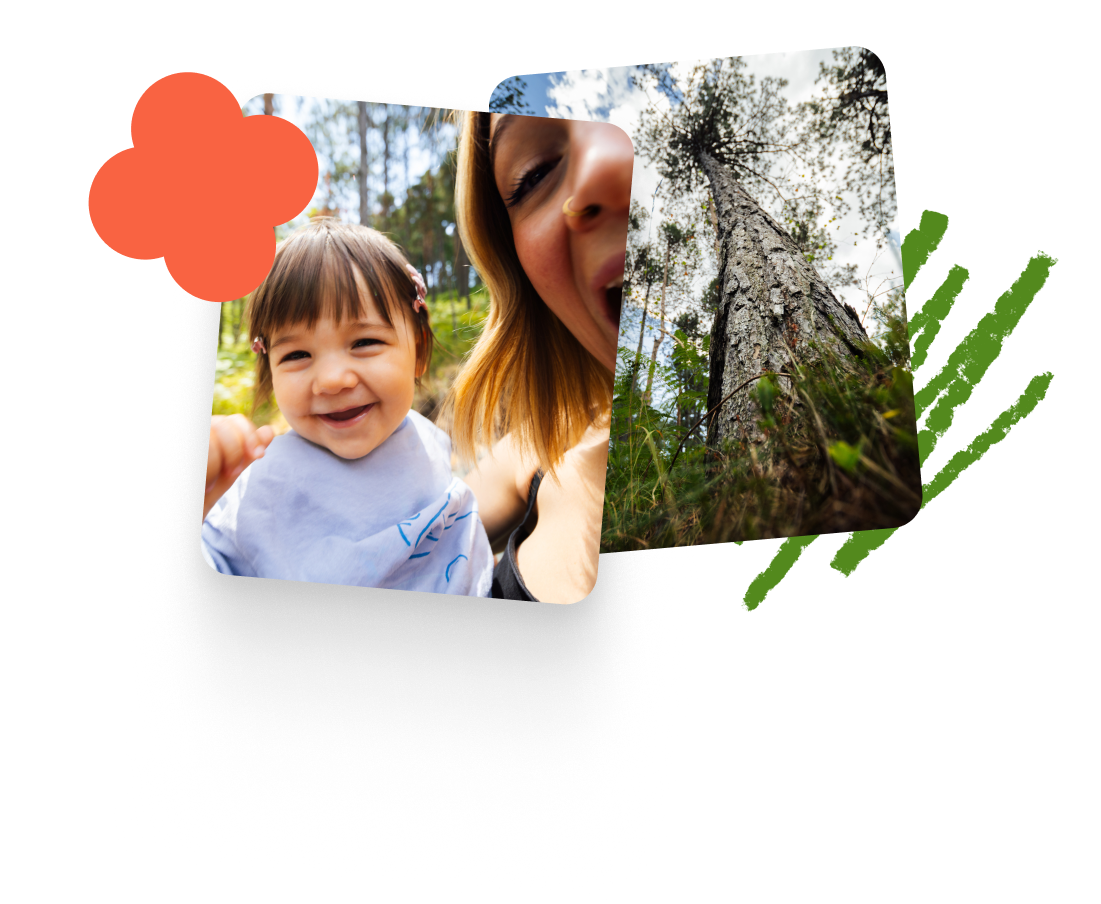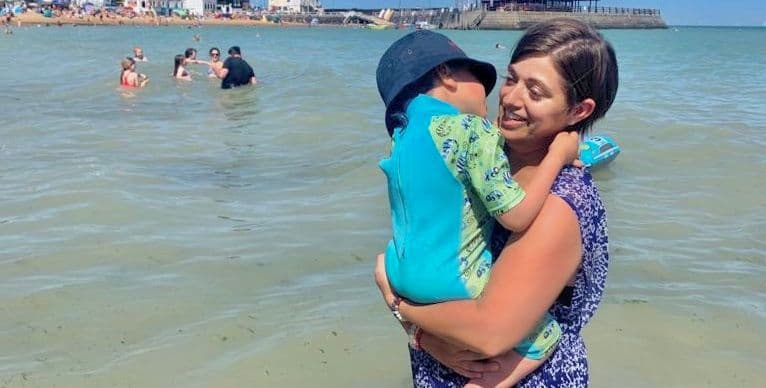
is now part of
Joy Parenting Club!
Families and care organisations using Heba will now have the option to also join Joy. For any questions, reach out to us at hello@heba.care

Families and care organisations using Heba will now have the option to also join Joy. For any questions, reach out to us at hello@heba.care

June 9, 2024
This single mum created a beautiful life with her son through self-kindness, asking for help and kicking social constructs to the curb. Here’s how.
Loneliness can come part and parcel with a kid who breaks the mould. And as a newly separated mum to a child with disability, it’s a feeling Genevieve Porritt got uncomfortably familiar with. But with support from her family and new friends in the parent-carer space, Gen honed tools to take care of herself. These days, she finds it hard to describe how her now seven-year-old son, Dylan, changed her life “from shit to incredible.”
The duo currently live in a small flat in Islington, North London, where you’d discover Finding Your Way Home, a book by Melody Beattie, on Gen’s nightstand. “It’s definitely a big insight into myself and my journey on a spiritual path of finding a way to be the best possible version of myself for myself, Dylan, our life and the world,” says Gen who, outside of her parent and carer roles, is a part-time special needs yoga teacher and co-creator of the F**king Normal podcast.
In her downtime, Gen’s been bingeing on The Leftovers, Halt and Catch Fire and Bad Sisters – and is partial to some “easy watching TV” in the form of First Dates, Married at First Sight and the Kardashians. She also enjoys juggling, making pottery, writing poetry and, when it suits her, doing sweet, blissful, nothing.
Read on to find out more about the joyful, carefully boundaried life that Gen has carved out as a parent carer to her son.
When we are expecting a child, we usually expect to be their parent, not their ‘carer’. Do you identify as a ‘carer’ to Dylan?
I do identify as Dylan’s carer and went through a process of defining the separate roles between mum and carer and how that manifests as a job. This process happened across the last three years as Dylan has become mentally and emotionally more independent and physically more dependent in comparison to his peers.
I find identifying as a carer reduces the stresses of my carer role and detaches it from the emotions I feel as a mother. Both are valid but, together, can become overwhelming. Defining the role of carer was also a way for me to internally justify my own struggle with the social construct and pressures of work as a woman and mother.

A lot changed in your life after Dylan was born, including your relationship status and home address. While also learning about Dylan's diagnosis and needs, how did you navigate these changes?
I left Dylan’s father when Dylan was 18 months old and moved home to my parents house. I moved all of Dylan’s medical care to North London and, in 2019, when Dylan was two, we got his official diagnosis. He has Ullrich congenital muscular dystrophy, a genetic muscle wasting condition which affects him physically.
During this time I lived in a struggle, survive, high-alert state. Everything I did was in a behaviour pattern related to unprocessed trauma from before Dylan was born and after. I was pretending to cope, attempting to control, in denial of reality… the list goes on.
Did I navigate this? Ha! It was the hardest time in my life. But in comparison to other hard times I finally had a reason to make good decisions and find support to work on my own mental health. That reason was Dylan.
I’d been working for a yoga company and through this found a spiritual path and coaching program which started my journey of deprogramming, healing and shifting towards a new perspective.
What were your biggest struggles in Dylan’s early months and years, and what helped you during this time?
I was so lost and alone. I just didn’t know what I was supposed to do and I didn’t know how to ask for help, trust my instincts, or trust myself. I was so hard on myself about any mistakes I made. I had something to prove but I had no idea how to do it, so I just pretended and coped. All of this, as well as my own and Dylan’s trauma, created an attachment between us and we both developed severe anxiety.
When I started the process of helping myself and asking for help, I was then able to learn about and create tools, and ask for help to support Dylan with his anxiety.
Nowadays, what does caring for Dylan tend to look like?
As I mentioned, Dylan is now mentally and emotionally strong and independent. Dylan uses a powered wheelchair and requires help with most physical and care activities. He is tube-fed on a blended diet and uses a ventilator and feeding pump overnight.
Can you compare your initial thoughts and feelings around parenting and caring for a child with disability to how you feel now?
I think so much of our struggle in the early days was more around our own healing process. Dylan has always been Dylan. He is a beautiful soul and that’s how I have always seen him. Pain, denial, anger and acceptance have been part of the process and they will continue to show up throughout life.
What do you find most challenging about being a parent carer? And on the flipside, what brings you the most joy?
Sleep deprivation and time management are the hardest. The love we have for ourselves and each other is the best. I have learnt how to love and how to accept myself and Dylan has helped me learn about patience, compassion, empathy and helping others. Being kind to ourselves and others brings me joy. Oh, and cold-water swimming, yoga, juggling, playing, art, pottery, poetry, singing, nature, walking, and doing nothing.

Humour can make tough situations and topics easier to navigate. What funny moments have you had while caring for Dylan?
Dylan and I often laugh at people’s awkwardness around him. Like how people climb over his wheelchair instead of saying ‘excuse me’ and how they are amazed at him driving his own chair. It’s ableist bullshit but it’s really fucking funny.
Dylan is hilarious and silliness is a massive part of our lives now. We talk simply and openly about disability and humour is always a good way to ease conversations.
‘Self-care’ is a bit of a dirty word in the parent carer space, as we’re often told to do it and rarely have the opportunity. If you do manage to get an hour or so to yourself, just for you (not chores!), what do you do?
I’m a massive advocate for self-care and probably speak from a privileged place being able to look after myself. But ultimately, I think self-care is actually self love and self acceptance – the simple acts of listening to yourself and your body and giving it what it needs, whether that be exercise, rest, good food, shit food, water, a shower, bath, early night, or nap. Any simple act of love for ourselves is self-care. It doesn’t need much time, cost or energy.
For me personally, I have a routine of weekly cold water swimming, yoga, and therapy.
What supports have you put around yourself – or do you hope to put around yourself – so you can be your best version of Dylan's parent carer?
Knowing that I can ask for help is huge. I’m lucky to have family close by who look after Dylan and he goes to his Dad’s every other weekend and Wednesdays, which gives me space to breathe and rest. I also accept and embrace being his carer and I am very careful with how much I do in terms of paid or unpaid work. I put myself first. I also access talking therapy when I need to and routinely go to spiritual retreats and workshops for time for myself, to share and reflect.
How did you start forming connections with other parents raising kids with disabilities, and what changed for you once you started forming these connections?
Chance encounters through Facebook and then a wonderful WhatsApp group which became a lifeline during Covid and has since been a beautifully safe space to vent and share experiences with people who get it. I don’t have a massive need for that anymore, but knowing that it’s there is a great comfort and reassurance that I’m not alone. Talking to someone about hospital appointments or sleep deprivation or ableist interactions without having to explain the enormity of these things – for it to be normal – warms my heart.
Looking to the future, what are your hopes and dreams around how Dylan is cared for and your role in his care?
We live in the moment and focus on joy and love. I’ve learnt that things work out the way they are supposed to and I know we always find a way that works for everyone, especially Dylan.
What do you wish other people knew about life as a parent carer?
The enormity of how tough it is, so they could have real empathy, and also how wonderful it is. How I find it hard to describe that Dylan changed my life from shit to incredible, not the other way around. That we see love in its most beautiful, purest form and we see what life is really about, not the social construct of life we are expected to believe.
What advice do you have for parents – and solo parents, in particular – who are new to caring for a child?
Get therapy. Be kind to yourself. Focus on your healing and happiness and your kid will thrive. Know that asking for help is a wonderful act of love for yourself and you are already enough.
Also, don’t expect unreliable people to be reliable. That never works out, and that’s okay.
What books/podcasts/TV shows/films/resources have you found relatable, inspiring and/or helpful as a parent carer?
F**king Normal Podcast.
What the F**k is Normal by Francesca Martinez.
Crip Camp on Netflix.
There She Goes on BBC.
Finally, is there anything else you’d like to add?
Our kids will make the world a better place. I know this because they already have.
Find out more about the F**king Normal podcast here and tune in wherever you like to listen to your pods.
Let’s clear out the complexities of care. Try Heba for free here.
Want to share your parent-carer story? We’d love to hear it. Get in touch with our team at hello@heba.care.